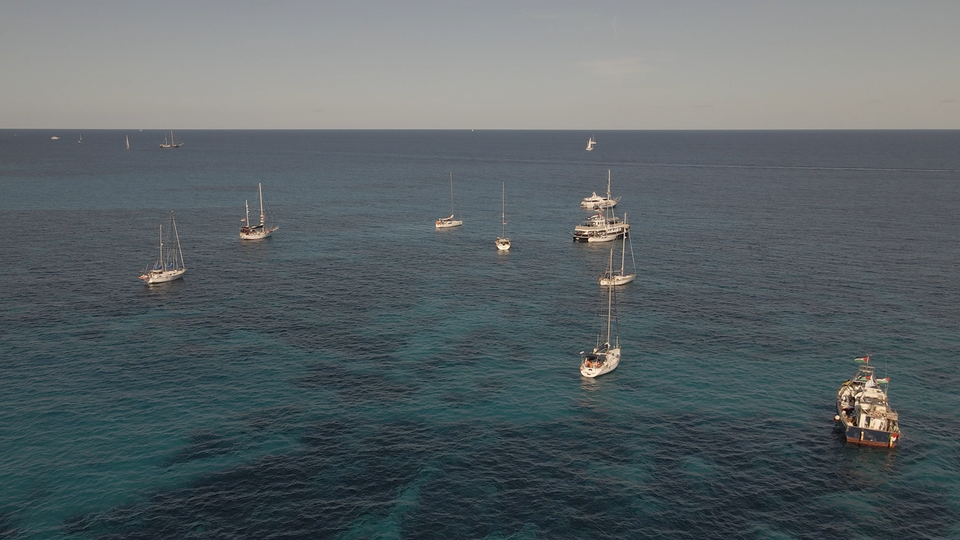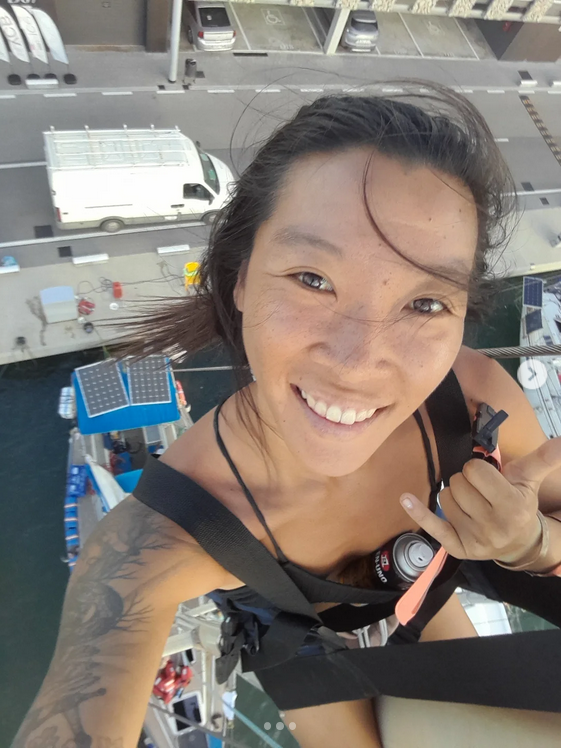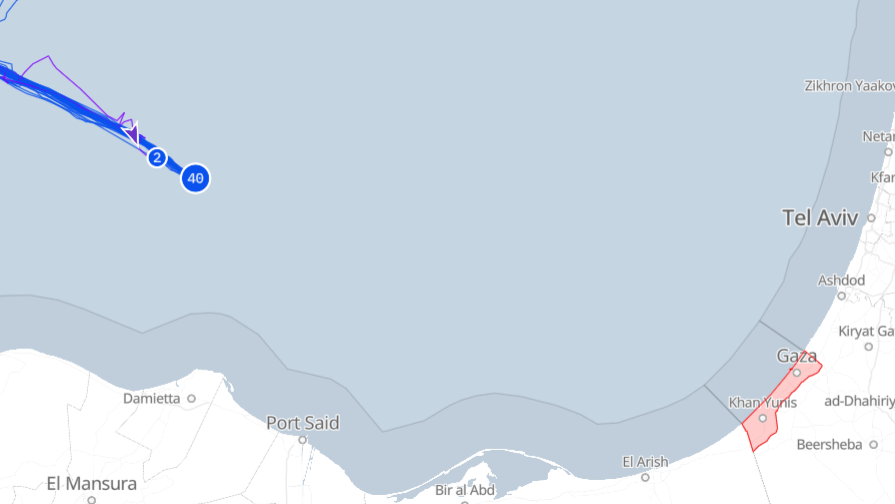Washington State resident and Gaza Flotilla participant intercepted by Israeli navy

Live updates are being posted at the top of the article. Scroll down for the original text.
Oct. 7 8:00 AM Pacific / 6:00 PM Palestine Time Update:
Washington State resident and Global Sumud Flotilla participant Jas Ikeda has been released after six days of detention by Israeli authorities. Ikeda is now enroute to the U.S., alongside other American flotilla activists.
Oct. 5 10:00 AM Pacific / 8:00 PM Palestine Time Update:
Jas Ikeda is among 42 Global Sumud Flotilla activists going on hunger strike to protest inhumane conditions within Israeli prisons. More than 300 flotilla members remain in detention, days after Israel illegally intercepted them.
Far-right Israeli security minister Itamar Ben-Gvir, a convicted terrorist, boasted of subjecting flotilla activists to poor treatment akin to that endured by Palestinian political prisoners. Rights groups say Palestinians are systematically tortured and starved in Israeli prisons.
Oct. 3 12:45 PM Pacific / 10:45 PM Palestine Time Update:
Rep. Rick Larsen (D-WA-02) has issued the following statement:
“I have been in touch with Jasmine’s family, and I am working with them to advocate for her immediate release. With the permission of Jasmine’s family, I can share that I have reached out to the State Department and requested the U.S. Embassy in Israel provide full and timely consular services to her. I am monitoring the situation closely to ensure Jasmine is provided with humane treatment while in custody, legal due process, and is released immediately from Israeli detention.”
Oct. 3 11:00 AM Pacific / 9:00 PM Palestine Time Update:
All 42 ships of the Global Sumud Flotilla have now been intercepted, with approximately 450 participants detained by the Israeli authorities. One ship, the Mikeno, did make it into Palestinian territorial waters and was just nine nautical miles off the Gaza Strip coast when it was intercepted.
According to Drop Site News, the lawyers for the activists allege Israel’s arrests to be entirely unlawful “from start to finish.” Detainees have been denied access to basic rights such as water, bathrooms and medications for hours, and some have been aggressively woken up by guards when they tried to sleep. A video of far-right, convicted terrorist Israeli Security Minister Itamar Ben-Gvir berating the flotilla activists as they were detained at Ashdod Port has also emerged. The detainees responded with chants of “Free Palestine.”
Jas Ikeda is believed to be among those detained. So far, none of her federal representatives, including Rep. Rick Larsen (D-WA-02) and Sens. Maria Cantwell and Patty Murray (D-WA) have made public statements about the detentions. Flotilla participants are expected to face special tribunals and subsequent deportation from Israel in the coming days.
The interception of the flotilla triggered massive protests across the globe, including one on Thursday evening in Capitol Hill, Seattle. Today, Italy has been brought to a standstill after unions called a one-day general strike to protest the Israeli naval blockade of Gaza.
Activists do not seem deterred, with another 10-ship flotilla is currently sailing toward Gaza right now and expected to arrive by the middle of next week.
Oct. 1 5:30 PM Pacific / Oct. 2 3:30 AM Palestine Time Update:
The Global Sumud Flotilla tracker now reports that 13 vessels have been intercepted by the Israeli navy, with 28 vessels remaining en route to Gaza. Those boats could reach the Gaza Strip coast within the next 7 to 8 hours, if they are not stopped.
Oct. 1 3:30 PM Pacific / Oct. 2 1:30 AM Palestine Time Update:
The Global Sumud Flotilla tracker has reported that 9 vessels have been intercepted by the Israeli navy. However, at least 22 boats are still sailing to Gaza, according to the GPS data. Novara Media reports that Israeli ships are also attacking the flotilla with water cannons, approximately 60 nautical miles off the coast of the Gaza Strip.
Oct. 1 10:30 AM Pacific / 8:30 PM Palestine Time Update:
Jas Ikeda, along with the rest of the crew of the Sirius-Haifa, has been intercepted by the Israeli navy, according to a press release from the Global Sumud Flotilla. In a prerecorded video, Ikeda appealed to U.S. government authorities to intervene on her behalf and ensure safe passage of the rest of the flotilla.
Sept. 30 10:00 PM Pacific / Oct. 1 8:00 AM Palestine Time Update
Ikeda sent me a voice memo, describing the flotilla's encounter with two Israeli navy ships. As a member of one of the two leading flotilla vessels, Ikeda was able to share her insight into what happened, saying:
“We had some vessels approach — a submarine and a [surface] military ship — come very close to our boat and circumnavigate [us], but they did not board,” Ikeda said. “They jammed our navigation and a lot of the electronics malfunctioned, leaving us unable to move for quite some time. My thought is that they are assessing the equipment we have on board and the technology, or lack thereof, that we have to combat their military tech.”
The flotilla has now resumed its approach to Gaza, but the situation remains tense and activists still expect the Israeli navy to attempt an interception. Ikeda also shared some of why chose to embark on the mission. Listen to full voice message here:
Washington State resident Jas Ikeda says she is in imminent danger of naval interception by Israel as a participant of the Global Sumud Flotilla (GSF), a humanitarian operation to deliver aid to Gaza, which has been under near-total blockade for nearly two years.
Launched from Barcelona on Aug. 31 the has sailed through the Mediterranean Sea carrying food, baby formula, medical equipment and other basic humanitarian aid and gathering contingents from more than 40 countries. There are currently 42 vessels taking part in the mission, and as of 9:00 PM Pacific Time on Sept. 30, are within 140 nautical miles (roughly 160 miles or 260 km) of the coast of the Gaza Strip. However, the flotilla is still within legally recognized international waters.
Official GSF communications have deemed this threshold the “high-risk zone” where Israeli naval ships are likely to intercept the vessels. As of 5:30 PM, the GSF Telegram channel reported drone activity above the flotilla.
At approximately 6:00 PM, Ikeda posted on Instagram that an Israeli ship was “very near” the flotilla in an apparent attempt to illegally board the boats. Ikeda, who is sailing with the vessel Sirius-Haifa, also called on international governments to intervene in support of the GSF and its mission.
“They are kidnapping us illegally, we pose no threat!” she wrote. “Please pressure global governments to stop the genocide, and to release us safely.”
Just before 9:00 PM, Ikeda uploaded a short video on Instagram saying “they have approached our vessels but have not boarded.”
Israel’s foreign ministry has pledged to stop any efforts to breach its naval blockade of Gaza and accused the GSF of having ties to Hamas. The GSF has strenuously denied these attacks, calling it a “disinformation campaign” and an “attempt to pre-emptively justify military action against a civilian-led, nonviolent, humanitarian mission.”
Ikeda is an experienced mariner and completed a voyage from the San Juan islands to Maui earlier this year. She is also a blacksmith apprentice and has experience in construction.
Jenna Reed, a friend and fellow Palestine solidarity activist, lives down the street from Ikeda on Orcas Island. She described Ikeda as a calm, level-headed advocate for justice. When the offer came in August to participate in the GSF, Ikeda was the perfect fit, with her combined organizing and maritime experience.
Reed said Ikeda understood the risk she was taking in such a daring humanitarian mission, but knew the urgency of the situation in Gaza demanded her to step up to the challenge.
“It was so clear that Jas had been looking for how to engage beyond where we are,” Reed said. “And so [Ikeda] sought out this opportunity, applied to the flotilla, and then decided if she was accepted, she would go. She had decided ahead of time — there would be no going back and forth about it.”

The GSF is the latest in a long tradition of direct action in support of Palestinians in Gaza, who have been under Israeli military occupation since 1967. In 2010, a humanitarian flotilla led by the MV Marmara was raided by Israeli commandos, who killed ten Turkish activists.
In the two years of war since Hamas’ attack on October 7, 2023 and the subsequent Israeli military assault, the humanitarian situation in the Gaza Strip has become catastrophic. Except for two brief ceasefires, the war has dragged on ceaselessly, with Israel killing more than 66,000 Palestinians, the vast majority of whom are civilians. Independent experts have estimated the death toll could be in the hundreds of thousands.
Scholars, human rights groups and international organizations such as the U.N. have declared that Israel’s actions constitute a genocide. On Aug. 22, U.N. affiliated agencies officially announced the presence of famine in Gaza City.
Within this context, GSF says the need for an independent humanitarian aid corridor into Gaza is more urgent than ever.
Over the last two years, the humanitarian group Freedom Flotilla Coalition (FFC) has attempted to establish a direct link to Gaza. In 2024, it attempted to sail two missions but was hampered by bureaucratic imbroglio, which the group accused the U.S., Israel and its allies of orchestrating. Then in May, a FFC ship was bombed by an Israeli drone off the coast of Malta. The organization launched two more single-ship flotillas in June and July which were both intercepted by the Israeli navy and featured prominent international activists like Greta Thunberg.
The participants were arrested and subsequently deported from Israel, with the aid confiscated. U.S. labor organizer Chris Smalls, one of the flotilla participants and the only Black member, was allegedly beaten and choked by Israeli soldiers.
The GSF is coordinated by a broad coalition of groups, including the FFC. Thunberg is once again a part of the flotilla as well as scores of lawmakers, journalists, medics, legal observers and other activists with a range of skills. While the total amount of aid the flotilla carries — about 250 tons according to Reuters — is insufficient to meet the needs of Palestinians in Gaza, the operation is intended to set a symbolic precedent for future convoys of aid.

Reed and other supporters of Ikeda have called their Congressional representatives Rep. Rick Larsen and Sens. Maria Cantwell and Patty Murray, to issue statements in support of the flotilla and its protection. So far, Reed said the lawmakers, who are all Democrats, have not responded to her inquiries. 18 Democratic congressmembers, including Seattle Rep. Pramila Jayapal, have signed a letter to Secretary of State Marco Rubio demanding protection of the GSF.
The risk of harm to GSF participants like Ikeda is of heightened concern in light of previous killings of Washington State activists by Israeli soldiers. In 2003, Rachel Corrie was killed while protesting illegal home demolitions in Gaza; last year, West Seattle resident Ayşenur Ezgi Eygi was killed by an Israeli sniper at a protest in the occupied West Bank.
Despite the danger, Reed said Ikeda was not afraid and had told her that courage was necessary to confront, and ultimately defeat, Israel’s violence against Palestine.
“There’s an element where the risk is worth it in the face of this huge, seemingly insurmountable violence that we are witnessing — in this genocide,” Reed said. “To accept the risk of violence upon us, upon our friend, is a strange, terrible honor in a way. It’s a long way of saying I’m afraid and I’m not.”
This is a developing story and will be updated with new information.

Member discussion